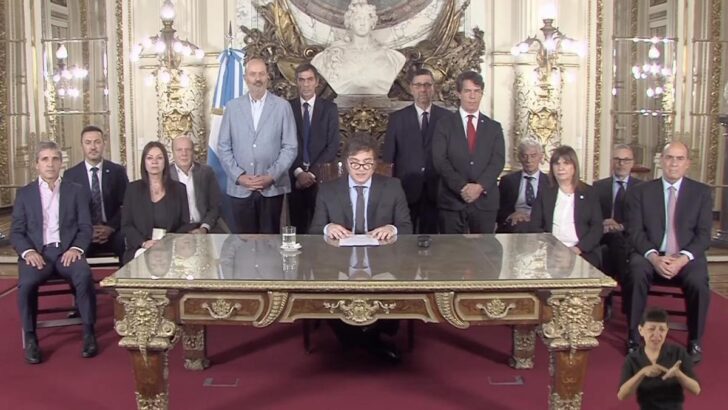Argentina’s democracy has rules. However, on Wednesday, December 20, several cities in our country were saturated with security forces. On national TV that night, President Javier Milei announced a decree of necessity and urgency (DNU), overstepping the competencies of the National Congress. He repealed or modified laws – whether for better or worse – that had been voted on by representatives from all provinces after years of agreements, debates and negotiations. This unilateral exercise of power not only breaches the division of powers but also exhibits clearly undemocratic behavior. The unconstitutionality of the DNU is evident, as it fails to meet the requirements necessary for its enactment.
DNU 70/2023 not only suppresses but also restricts people’s rights, all to the benefit of certain economic groups securing extraordinary profits. Contrary to the notion of economic deregulation, it aims to establish a new regime, in the words of its own author. This regime seeks to enforce new state and social regulation through the repeal and modification of over 300 laws, thus favoring specific corporations at the expense of the general population. Its impact spares no sphere of life. Should it come into effect, no right will remain unassailed ¬– from work to access to food, health, and the right to housing. Essentially, Javier Milei’s government is modifying the Constitution by unilateral decree.
Social inequalities are also a byproduct of policies that favor specific economic sectors. This persistent problem, accumulating over years, is eroding the middle class while expanding the population living in poverty. According to our Constitution, it is the State’s role to counteract and alleviate such inequalities. However, this DNU aggravates the existing fragility and vulnerability faced by children, adolescents, the elderly, and the broader workforce, including those suffering from illnesses, thus putting regional economies on the brink of crisis.
This decree further jeopardizes quality of life by transforming what was once the norm – the ability to pay for health insurance or rent decent housing – into an exception. Instead of raising the standards of labor protection, the general rule for employment is veering toward precariousness for everyone. As a consequence, the prices of essential goods like food and medicine will become inaccessible for ever-wider sectors of the population.
Congress is faced with a responsibility capable of reshaping the country’s destiny. It is urgent that Congress return to session and reject this decree. This authoritarian shift by President Milei cannot be rectified if Congress endorses the DNU, given that the DNU imposes a procedure that negates the comprehensive process typically associated with handling a bill, circumventing committee passages, debates, and public hearings.
The proposed overhaul of laws, touching nearly every facet of our social fabric, requires widespread democratic debate that must take place inside and outside the National Congress, engaging those we elect to legislate. Should Congress validate the decree, it will relinquish its fundamental functions and contribute to the erosion of institutional norms. Forty years into the most recent democratic era in Argentina, the risk of an anti-democratic turn becomes increasingly disconcerting.
Photo: TV capture.

